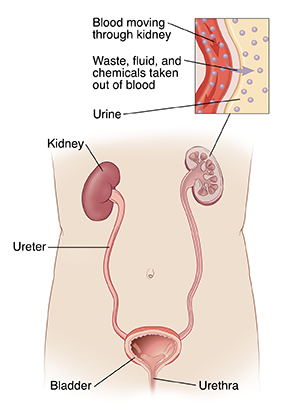The kidneys’ main job is to clean the blood. They filter wastes and excess fluids from your blood each day. This helps maintain the chemical balance the body needs to stay healthy and alive. One working kidney, even part of a kidney, is enough to do this job. If both kidneys fail, their work must then be done another way.
Kidneys filter the blood
Your 2 kidneys are located just above your waist and below your rib cage toward your back, on either side of the spine. They are bean-shaped and the size of your fist. They filter blood through filtering units called nephrons. There are about 1 million nephrons per kidney. The nephrons:
-
Remove waste and fluid. The kidneys take waste products, such as urea, from the blood. They also remove unneeded fluid.
-
Balance chemicals. The body needs chemicals (such as calcium, sodium, potassium, and phosphorus) to work. Too little or too much of them can make you sick. In the kidneys, chemicals are taken from or added to the blood. This keeps them in the right balance.
The kidneys’ other tasks
In addition to filtering the blood, the kidneys do other tasks. These include:
-
Making erythropoietin to tell the bone marrow to make red blood cells (erythrocytes). These are the cells in the blood that carry oxygen.
-
Helping control blood pressure by making and releasing the enzyme renin.
-
Helping keep bones strong by making a form of vitamin D called calcitriol.
The kidneys may be damaged by a number of conditions. These include:
-
Diabetes
-
High blood pressure
-
Smoking
-
Inherited conditions
-
Immune disorders
-
Injury
-
Certain medicines


